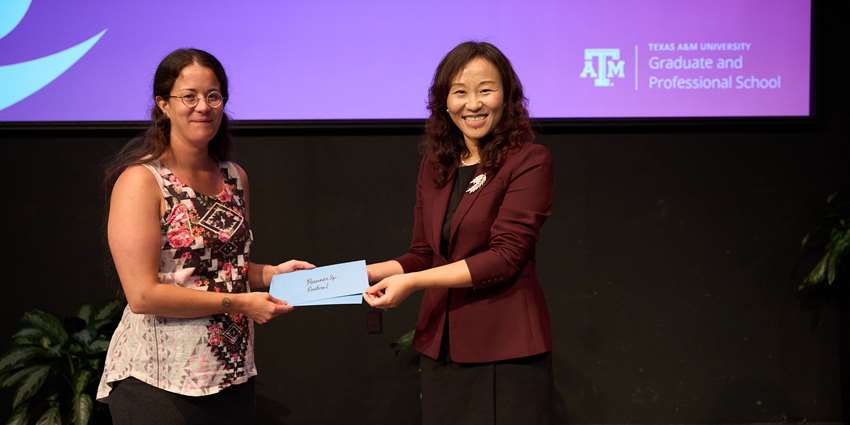Dallas Williams receiving second place and the People’s Choice Award in the doctoral division at the Three Minute Thesis Finals competition. Photo courtesy of the Texas A&M University Department of Soil and Crop Sciences
Could using alternative materials for rain gardens make them more efficient and sustainable? Dallas Williams, a Ph.D. candidate in the Department of Soil and Crop Sciences at Texas A&M University, was a recipient of a 2022 Mills Scholarship from the Texas Water Resources Institute and used the funds to support her research in evaluating the environmental impacts of using alternative materials for rain garden design.
This research delves into the most sustainable and effective fill mixture for the rainwater to best infiltrate into the soil, helping to reduce stormwater runoff and replenish groundwater supplies.
While knowing that the normal fill for rain gardens is mined sand, a commodity expected to be less available in the future, Williams has angled her research to find a more sustainable solution.
“My team and I were able to test different filtration materials such as crushed oyster shell, glass or shale mixed with clay soil to perform similarly to sand,” she said.
Williams found that having these types of fill mixtures can improve water infiltration and increase the amount of stormwater runoff captured during rainfall events compared to clay soil alone.
Along with deterring runoff, Williams and her team were also studying how these fill mixtures can decrease levels of pollutants.
“Pollutants such as zinc, phosphorus, copper and lead were seen to have similar or lower concentrations in outflow when the alternative fill mix was used instead of sand,” she said.

The Mills Scholarship has allowed Williams and her team to analyze the water that was filtrated through the fill mix as well as enabling her to include the aid of undergraduates in this research.
“This project has really helped me gain some valuable experience in green infrastructure and understanding more environmentally friendly strategies to improve stormwater management and reduce runoff during storm events,” Williams said.
Next, Williams plans on doing a modeling portion of this study, where her team will use a computer model to simulate a watershed in Houston to see, if these types of rain garden systems were implemented in the real world, how would those affect stream flow dynamics.
Williams has high hopes that this will be a step in furthering sustainable approaches to urban water conservation in Texas.
“I am so grateful for the ability to have this opportunity,” she said. “Without the support of TWRI and my advisor, Dr. Briana Wyatt, none of this research would have been possible.”



